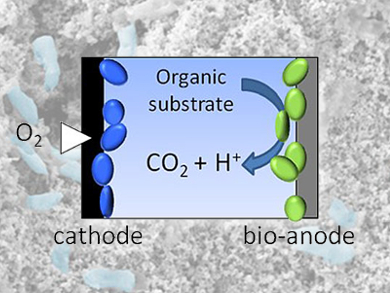Microbial fuel cells (MFCs) are a green technology well suited to address two aspects of sustainability at once: the production of clean energy and the efficient disposal of waste. In MFCs, bacteria break down organic matter, transferring the electrons produced from a series of enzymatic redox processes to the electrodes.
Commercial applications are still limited because of the complexity of scaling up the devices and the high cost of materials, mostly related to the use of platinum as a catalyst for the oxygen reduction reaction (ORR) at the cathode. Replacing platinum with inexpensive alternatives, such as earth-abundant elements including carbon, can be an effective approach for further developing and commercializing MFCs.
Barbara Mecheri, University of Rome “Tor Vergata”, Italy, and colleagues have prepared inexpensive cathodes based on carbon black and zirconium oxide (C/ZrO2) which have good ORR activity at MFC cathodes. One added benefit of the zirconium component is that it inhibits the formation of contaminating biofilms on the cathodes – a significant problem in MFC applications. Analysis of the MFC performance and cost of cathode construction indicates that the energy generated by the C/ZrO2-based cells is more than 15 times cheaper than that generated by conventional platinum-based MFCs.
- Carbon-Supported Zirconium Oxide as a Cathode for Microbial Fuel Cell Applications,
Barbara Mecheri, Alessandro Iannaci, Alessandra D’Epifanio, Arianna Mauri, Silvia Licoccia,
ChemPlusChem 2015.
DOI: 10.1002/cplu.201500347




